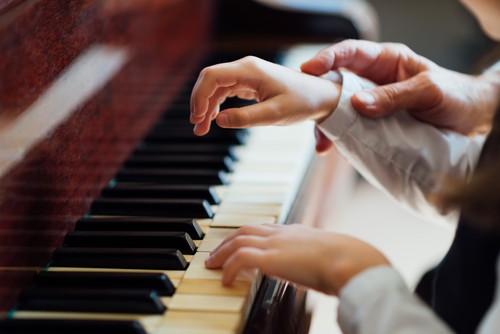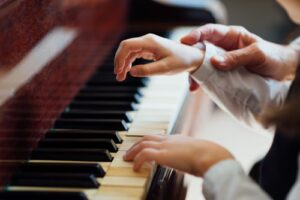
Some musical instruments are harder to master than others. As with all musical instruments, it’s much easier to learn when the learner is younger. This allows for the development of the physical attributes needed to operate the instrument. However, the inverse is also true! Musicians will inform you that the learning involved in effectively playing certain instruments must be inculcated at a young age.
A musician must grow up playing an instrument to gain complete familiarity in terms of rhythm and musical theory such as pitch and octaves; only then can they claim to be proficient at their chosen instrument. Certain instruments can be picked up at any time, and a great first instrument that we recommend for individuals of all ages is the piano.
Pianos are generally taught to young children, as they are easy to operate and offer immediate gratification as the child successfully plays keys and produces basic notes. Making mistakes is inherent when learning anything new; however, children and adults alike, face highly discouraging challenges and will often times stop practicing. Due to the versatility of their scale, pianos provide the best musical platform, as you will never feel unaccomplished; learners are taught how to play songs and tunes with just 5 keys.
Through this article, we seek to inform you of the best age for you to start taking piano lessons.
What is a Piano?
Historical records show the piano originated somewhere in the 1450’s, its precursor being the organ. The piano is a stringed acoustic instrument that plays notes by producing vibrations through internally located strings owing to the impact caused by an attached hammer, which is operated by pressing down on the keys.
Piano’s today are found as three types:
- Grand
- Upright
- Digital
Upright pianos are the ones generally found in homes. Grand Pianos are mostly used in orchestras and seen in theatres. Digital pianos are recent inventions that feature weighted keys to feel like an actual piano. These pianos do not require tuning as the sound is electronically produced through an amplifier.
Why Should You Learn The Piano?
Learning how to play the piano has many benefits such as discipline, improved hand-eye coordination, and increased intelligence. Additionally, research has linked playing instruments to increases in memory, spatial learning, and verbal literacy. Many competent and capable instructors in Dallas are willing to tutor enthusiastic learners at home.
Requirements for Learning
Certain instruments require previous experience with other similar implements; the flute is one such example, which is taught after students learn the recorder. Similarly, the piano also has a few pre-requisites that must be satisfied for you to learn it well.
Firstly, the prospective student must be sufficiently developed to have moderately sized hands with fingers that can easily occupy five adjacent keys. This requirement rules out children of ages younger than six, though you will find exceptional cases.
Second, the student must have command over their motor functions to move each finger independently of one another. Without the basics of dexterity, a student cannot strike keys in the order required by the set being played.
Finally, the student must display an interest towards learning the piano. If you are easily dismayed and lose attention, then it is better to develop an appreciation for the instrument before coming back to it.
The ‘Right’ Age
The aforementioned requirements bring us to the recommended age for learning the piano. Seasoned musicians, providing capable piano tutelage all agree that a person can learn to play the piano at any age.
Keeping in mind the requirements stated above, it is recommended that students be aged older than 6 years of age. After 6 years of age children are developed and mature enough to strike each key, with capable dexterity, and are willing to learn from tutors without distractions.
Equipment and Costs
Other factors to consider are associated costs and the equipment needed to play the piano. The student requires a piano and a stool; the latter of which offers sufficient elevation and allows them to maintain their hands at level with the keys.
Acquiring a piano requires a sizeable investment; new pianos start at $3000 and come with warranties. A secondhand pair can be found for as low as $1500; however, make sure you get it thoroughly checked by a technician to ascertain that its quality and function are up to par.
Time Commitment
An important factor to consider at the outset is the time commitment required to learn the piano. Lessons are generally held once a week and last for a period of 30 minutes to an hour depending on the skill level and age of the student.
Students are asked to practice daily for a minimum of 20 minutes. With dedication and commitment towards learning the piano; listening to your tutor and practicing daily, you can master the instrument in due time.
